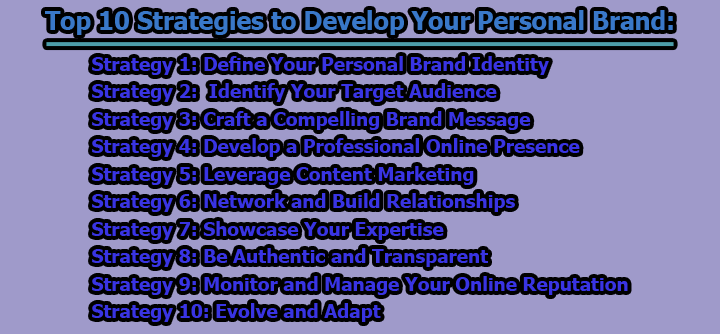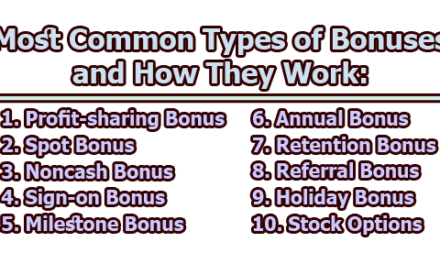Top 10 Strategies to Develop Your Personal Brand:
Developing a personal brand is a multifaceted and ongoing process that requires thoughtful planning, consistency, and dedication. In this guide, we will explore the top 10 strategies to develop your personal brand and establish a strong and authentic presence in your chosen field. Each strategy will be thoroughly explained, providing you with actionable steps to take your personal brand to the next level.
Strategy 1: Define Your Personal Brand Identity:
The first and most crucial step in developing your personal brand is to define your brand identity. This involves understanding who you are, what you stand for, and what makes you unique. Here’s how to do it:
a) Self-Reflection: Take the time to introspect and identify your core values, passions, strengths, and areas of expertise. Reflect on your achievements, experiences, and the skills that set you apart from others.
b) Purpose and Mission: Craft a clear mission statement that outlines your purpose and the impact you want to make. Your mission should align with your values and resonate with your target audience.
c) Brand Personality: Determine the personality traits and communication style that represent you and your brand. Are you approachable, authoritative, or innovative? Your brand personality should be consistent across all touchpoints.
Strategy 2: Identify Your Target Audience:
To build an effective personal brand, you need to know who your target audience is—the people you want to connect with, influence, and serve. Understanding your audience will help you tailor your brand message and content to meet their needs. Follow these steps:
a) Research Your Audience: Conduct thorough research to identify your target audience’s demographics, interests, pain points, and preferences. Use tools like surveys, social media analytics, and market research to gather valuable insights.
b) Create Buyer Personas: Develop buyer personas representing your ideal audience segments. These personas should encompass their characteristics, motivations, and challenges, helping you align your brand with their needs.
c) Address Their Pain Points: Identify the pain points and challenges your audience faces and position yourself as the solution. Offer valuable content and insights that address their specific issues.
Strategy 3: Craft a Compelling Brand Message:
Your brand message is the core of your personal brand and should succinctly convey who you are, what you do, and the value you provide. Create an elevator pitch that leaves a lasting impression on your audience. Follow these guidelines:
a) Define Your Unique Selling Proposition (USP): Identify your USP – the unique aspect that differentiates you from others in your field. It could be a specific skill, a niche expertise, or your distinctive approach to problem-solving.
b) Highlight Your Value Proposition: Clearly communicate the benefits and value you offer to your audience. How will your expertise make their lives better, easier, or more successful?
c) Tailor Your Message to Your Audience: Adapt your brand message to resonate with your target audience’s interests and needs. Speak their language and address their pain points directly.
Strategy 4: Develop a Professional Online Presence:
In today’s digital age, a strong online presence is essential for building your personal brand. Establish a professional and cohesive online identity that showcases your expertise and personality. Here’s how:
a) Create a Personal Website or Blog: Develop a personal website or blog to serve as the hub of your online presence. Include an “About Me” page, portfolio, blog section, and contact information.
b) Optimize Your Social Media Profiles: Update and optimize your social media profiles to reflect your brand identity consistently. Use a professional photo, write compelling bios, and include links to your website.
c) Choose the Right Platforms: Select the social media platforms that align with your target audience’s preferences. Focus on the platforms where your audience is most active.
d) Create and Share Valuable Content: Regularly publish high-quality content that provides value to your audience. This could include blog posts, videos, infographics, or podcasts.
e) Engage and Interact: Engage with your audience on social media and respond to comments and messages promptly. Interact with industry peers and thought leaders to expand your network.
Strategy 5: Leverage Content Marketing:
Content marketing is a powerful tool for building your personal brand and positioning yourself as an authority in your field. Here’s how to make the most of content marketing:
a) Create a Content Strategy: Develop a content strategy that aligns with your brand message and addresses your audience’s needs. Plan the topics, formats, and publishing schedule in advance.
b) Blogging and Article Writing: Write insightful blog posts and articles on topics related to your expertise. Guest post on reputable websites and contribute to industry publications to increase your reach.
c) Video and Podcasting: Leverage video and podcasting to connect with your audience in a more personal and engaging way. Host interviews, share valuable insights, and showcase your expertise.
d) Visual Content: Incorporate visual content, such as infographics and slideshows, to present complex information in an easily digestible format.
e) Repurpose Content: Repurpose your content into different formats to reach a broader audience. For example, turn a blog post into a video or vice versa.
Strategy 6: Network and Build Relationships:
Networking is a fundamental aspect of personal branding. Building meaningful relationships with peers, industry influencers, and potential clients can lead to new opportunities and collaborations. Follow these steps:
a) Attend Industry Events and Conferences: Participate in conferences, seminars, workshops, and networking events related to your field. Take advantage of these opportunities to connect with like-minded individuals.
b) Engage in Online Communities: Join online forums, LinkedIn groups, and other digital communities relevant to your niche. Contribute valuable insights and engage in discussions.
c) Collaborate with Peers: Seek opportunities to collaborate with other professionals in your industry. Joint projects and partnerships can expand your reach and credibility.
d) Provide Value: Be generous with your knowledge and expertise. Offer help, advice, and support to others without expecting immediate returns.
e) Follow Up and Stay Connected: After networking events or online interactions, follow up with your new connections to strengthen the relationship. Stay connected through regular updates and occasional messages.
Strategy 7: Showcase Your Expertise:
To build a strong personal brand, you must demonstrate your expertise and authority in your chosen field. Here are some ways to showcase your skills:
a) Case Studies and Success Stories: Share case studies and success stories that demonstrate how you have helped clients or employers achieve their goals.
b) Public Speaking and Webinars: Offer to speak at conferences, webinars, and industry events. Public speaking enhances your visibility and positions you as an expert.
c) Publish Research and Thought Leadership: Conduct original research or share thought leadership articles to demonstrate your in-depth knowledge of your field.
d) Secure Media Coverage: Pitch yourself to media outlets and seek opportunities for interviews or expert commentary on industry-related topics.
Strategy 8: Be Authentic and Transparent:
Authenticity is the key to building trust and credibility with your audience. Be genuine in your interactions and transparent about your values and beliefs. Follow these guidelines:
a) Stay True to Your Brand Identity: Consistently represent your brand identity in all interactions, whether online or offline.
b) Share Your Story: Tell your personal and professional journey, including both successes and challenges. Authentic storytelling connects you with your audience on a deeper level.
c) Be Honest About Mistakes: Nobody is perfect, and acknowledging mistakes shows humility and authenticity. Use these opportunities to learn and grow.
d) Engage Authentically: When interacting with your audience, be genuinely interested in their needs and concerns. Respond to feedback and criticism with grace.
Strategy 9: Monitor and Manage Your Online Reputation:
In the digital age, your online reputation plays a significant role in shaping your personal brand. Proactively manage and protect your online image with these steps:
a) Regularly Google Yourself: Regularly search your name and monitor what comes up in the search results. Address any negative or misleading information promptly.
b) Respond to Reviews and Feedback: If your brand receives reviews or feedback online, respond to them professionally and constructively.
c) Control Your Privacy Settings: Manage your privacy settings on social media and other online platforms to control what others can see about you.
d) Build Positive Online Assets: Create positive online assets, such as guest posts, interviews, and testimonials, to boost your online reputation.
Strategy 10: Evolve and Adapt:
Personal branding is an ongoing journey. As you progress in your career or business, your personal brand may need to evolve to stay relevant. Here’s how to adapt:
a) Stay Current with Trends: Keep yourself informed about the latest trends and developments in your industry. Continuously update your knowledge and skills.
b) Seek Feedback and Reflect: Seek feedback from your audience, peers, or mentors to gain insights into your brand’s effectiveness. Regularly reflect on your personal and professional growth.
c) Embrace Change: Embrace change and be open to trying new strategies to enhance your personal brand. Adapt to evolving market needs and audience preferences.
d) Rebrand with Purpose: If necessary, consider rebranding your personal brand to reflect your growth and align with your evolving mission.
Developing a strong personal brand is a multi-faceted process that requires careful planning, consistency, and authenticity. By defining your brand identity, identifying your target audience, crafting a compelling brand message, and leveraging content marketing and networking, you can establish an impactful personal brand. Be authentic, transparent, and proactive in managing your online reputation, and stay adaptable to evolve with the changing landscape of your industry. Building a strong personal brand takes time and effort, but it can lead to exciting opportunities, increased influence, and personal fulfillment in both your professional and personal life.
Why You Need a Strong Personal Brand:
Developing a strong personal brand is not just a buzzword or a trendy marketing tactic; it is a fundamental aspect of success in today’s interconnected world. A well-crafted personal brand can have a significant impact on various aspects of your personal and professional life. In this detailed explanation, we will explore why you need a strong personal brand and the benefits it can bring.
i. Differentiation in a Competitive Landscape: In almost every industry, competition is fierce. Whether you are a professional, entrepreneur, freelancer, or job seeker, standing out from the crowd is essential. A strong personal brand helps you differentiate yourself from others with similar qualifications and experience. It highlights your unique strengths, skills, and expertise, making you more memorable to potential clients, employers, or partners.
ii. Enhanced Career Opportunities: In the professional world, a strong personal brand can open doors to new career opportunities. Employers and recruiters are more likely to notice and consider individuals with a well-established personal brand. A compelling personal brand showcases your expertise, accomplishments, and values, making you an attractive candidate for job openings and promotions.
iii. Increased Trust and Credibility: Building a strong personal brand requires consistency and authenticity. When you consistently deliver value and maintain a trustworthy image, your audience will perceive you as credible and reliable. People are more inclined to engage with and trust individuals they perceive as experts in their field.
iv. Expanded Professional Network: A strong personal brand attracts like-minded individuals and potential clients or collaborators. Your brand message and content can resonate with people who share your interests, goals, and values. As you build your network, you gain access to a community of supportive peers, mentors, and industry leaders.
v. Influence and Thought Leadership: Establishing yourself as an authority in your niche positions you as a thought leader. A strong personal brand enables you to influence and educate your audience, making you a go-to resource for valuable insights and information. Thought leaders often have a powerful impact on shaping industry trends and best practices.
vi. Increased Client or Customer Base: For entrepreneurs and freelancers, a compelling personal brand can be a powerful marketing tool. When potential clients can connect with your brand story and see the value you offer, they are more likely to choose your products or services over competitors. A strong personal brand can lead to higher client acquisition and retention rates.
vii. Improved Networking Opportunities: Networking is a critical aspect of personal and professional growth. A strong personal brand attracts networking opportunities, such as speaking engagements, conference invitations, and participation in industry events. Networking can lead to potential partnerships, collaborations, and joint ventures.
viii. Personal Fulfillment and Confidence: Developing a strong personal brand involves self-reflection and alignment with your values and passions. When your brand represents who you truly are, it brings a sense of personal fulfillment. A well-established personal brand can also boost your confidence and self-assurance as you navigate your career or business.
ix. Crisis Management and Reputation Protection: In times of crisis or negative publicity, a strong personal brand can act as a buffer. A positive online reputation and a loyal audience can support you through challenging situations and protect your image.
x. Long-Term Success and Sustainability: A strong personal brand is an investment in your long-term success and sustainability. As your brand grows and evolves, so does your impact and influence. A consistent and authentic personal brand can pave the way for a rewarding and fulfilling career or business journey.
In conclusion, a strong personal brand is a powerful tool to differentiate yourself, advance your career, and open up new opportunities. It requires thoughtful reflection, consistency, and continuous effort to build and maintain. By defining your values, understanding your audience, sharing valuable content, and leveraging digital platforms, you can develop an authentic and impactful personal brand that sets you apart from the competition. Remember that personal branding is an ongoing journey, and it requires adaptability and a genuine commitment to delivering value to your audience.
Frequently Asked Questions [FAQs]:
What is a personal brand, and why is it important?
A personal brand is the unique combination of skills, expertise, values, and personality that sets an individual apart from others. It is how you present yourself to the world and how others perceive you. Developing a strong personal brand is important because it differentiates you in a competitive landscape, enhances career opportunities, builds trust and credibility, and allows you to influence and connect with your target audience.
How do I define my personal brand identity?
Defining your personal brand identity involves self-reflection and understanding your core values, passions, strengths, and expertise. It also requires crafting a clear mission statement that aligns with your values and resonates with your target audience. Consider what makes you unique and what you want to be known for in your chosen field.
What are some practical steps to develop a personal brand online?
To develop a personal brand online, start by creating a professional website or blog that showcases your expertise and personality. Optimize your social media profiles to reflect your brand identity consistently. Create and share valuable content that addresses your audience’s needs. Engage with your audience and network with peers and industry influencers.
How can a strong personal brand help with career advancement?
A strong personal brand can help with career advancement by making you more visible and memorable to employers and recruiters. It showcases your expertise and accomplishments, positioning you as a credible and reliable professional. This can lead to more job opportunities, promotions, and career growth.
What are the benefits of content marketing for personal branding?
Content marketing is a powerful tool for personal branding as it allows you to showcase your expertise and provide value to your audience. Creating valuable content, such as blog posts, articles, videos, or podcasts, positions you as an authority in your field and helps you connect with your target audience on a deeper level.
How can networking contribute to building a strong personal brand?
Networking allows you to build meaningful relationships with like-minded individuals, potential clients, and industry influencers. Engaging in networking events and online communities helps expand your network, opens up new opportunities, and enhances your brand’s visibility and credibility.
How can I stay authentic and transparent while developing my personal brand?
Authenticity and transparency are essential for building trust with your audience. Be genuine in your interactions and share your personal and professional journey, including both successes and challenges. Be honest about your values, beliefs, and mistakes, and engage with your audience authentically.
Can a personal brand evolve over time?
Yes, a personal brand can and should evolve over time. As you gain new experiences, skills, and insights, your personal brand may need to adapt to reflect your growth and align with your changing mission. Rebranding with purpose can be a strategic move to stay relevant and impactful in your field.
How can a strong personal brand help during crisis management?
In times of crisis or negative publicity, a strong personal brand can act as a buffer. A positive online reputation and a loyal audience can support you through challenging situations and protect your image. Having a strong personal brand can help you address crises with grace and maintain your credibility.
Is personal branding only relevant for entrepreneurs and professionals, or can it benefit individuals in other situations?
Personal branding is relevant for individuals in various situations. It can benefit professionals, entrepreneurs, freelancers, job seekers, students, and even individuals pursuing personal passions or causes. A strong personal brand helps individuals stand out, build trust, and create meaningful connections, regardless of their specific goals or roles.

Library Lecturer at Nurul Amin Degree College










